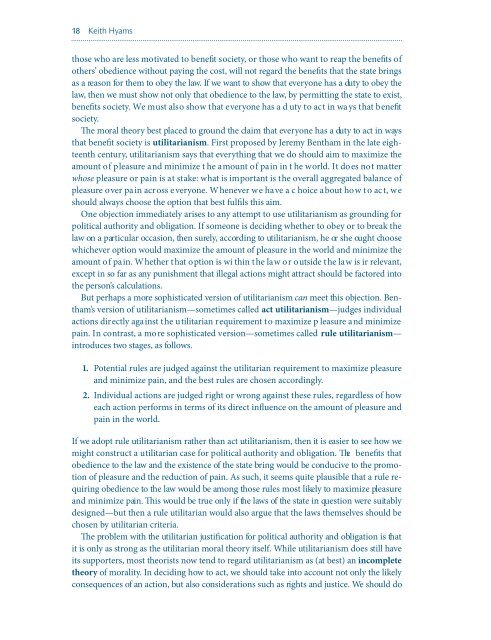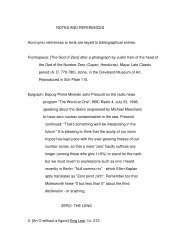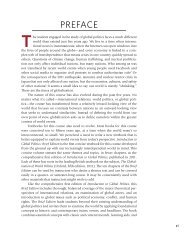1 Political authority and obligation Political authority and obligation
1 Political authority and obligation Political authority and obligation
1 Political authority and obligation Political authority and obligation
You also want an ePaper? Increase the reach of your titles
YUMPU automatically turns print PDFs into web optimized ePapers that Google loves.
18 Keith Hyams<br />
those who are less motivated to benefi t society, or those who want to reap the benefi ts of<br />
others’ obedience without paying the cost, will not regard the benefi ts that the state brings<br />
as a reason for them to obey the law. If we want to show that everyone has a duty to obey the<br />
law, then we must show not only that obedience to the law, by permitting the state to exist,<br />
benefi ts society. We must also show that everyone has a d uty to act in wa ys that benefi t<br />
society.<br />
Th e moral theory best placed to ground the claim that everyone has a duty to act in ways<br />
that benefi t society is utilitarianism. First proposed by Jeremy Bentham in the late eighteenth<br />
century, utilitarianism says that everything that we do should aim to maximize the<br />
amount of pleasure <strong>and</strong> minimize t he amount of pain in t he world. It does not matter<br />
whose pleasure or pain is at stake: what is important is the overall aggregated balance of<br />
pleasure over pain across e veryone. Whenever we have a c hoice about how to ac t, we<br />
should always choose the option that best fulfi ls this aim.<br />
One objection immediately arises to any attempt to use utilitarianism as grounding for<br />
political <strong>authority</strong> <strong>and</strong> <strong>obligation</strong>. If someone is deciding whether to obey or to break the<br />
law on a particular occasion, then surely, according to utilitarianism, he or she ought choose<br />
whichever option would maximize the amount of pleasure in the world <strong>and</strong> minimize the<br />
amount of pain. Whether that option is wi thin the law or outside the law is ir relevant,<br />
except in so far as any punishment that illegal actions might attract should be factored into<br />
the person’s calculations.<br />
But perhaps a more sophisticated version of utilitarianism can meet this objection. Bentham’s<br />
version of utilitarianism—sometimes called act utilitarianism—judges individual<br />
actions directly against the utilitarian requirement to maximize p leasure <strong>and</strong> minimize<br />
pain. In contrast, a more sophisticated version—sometimes called rule utilitarianism—<br />
introduces two stages, as follows.<br />
1. Potential rules are judged against the utilitarian requirement to maximize pleasure<br />
<strong>and</strong> minimize pain, <strong>and</strong> the best rules are chosen accordingly.<br />
2. Individual actions are judged right or wrong against these rules, regardless of how<br />
each action performs in terms of its direct infl uence on the amount of pleasure <strong>and</strong><br />
pain in the world.<br />
If we adopt rule utilitarianism rather than act utilitarianism, then it is easier to see how we<br />
might construct a utilitarian case for political <strong>authority</strong> <strong>and</strong> <strong>obligation</strong>. Th e benefi ts that<br />
obedience to the law <strong>and</strong> the existence of the state bring would be conducive to the promotion<br />
of pleasure <strong>and</strong> the reduction of pain. As such, it seems quite plausible that a rule requiring<br />
obedience to the law would be among those rules most likely to maximize pleasure<br />
<strong>and</strong> minimize pain. Th is would be true only if the laws of the state in question were suitably<br />
designed—but then a rule utilitarian would also argue that the laws themselves should be<br />
chosen by utilitarian criteria.<br />
Th e problem with the utilitarian justifi cation for political <strong>authority</strong> <strong>and</strong> <strong>obligation</strong> is that<br />
it is only as strong as the utilitarian moral theory itself. While utilitarianism does still have<br />
its supporters, most theorists now tend to regard utilitarianism as (at best) an incomplete<br />
theory of morality. In deciding how to act, we should take into account not only the likely<br />
consequences of an action, but also considerations such as rights <strong>and</strong> justice. We should do

















